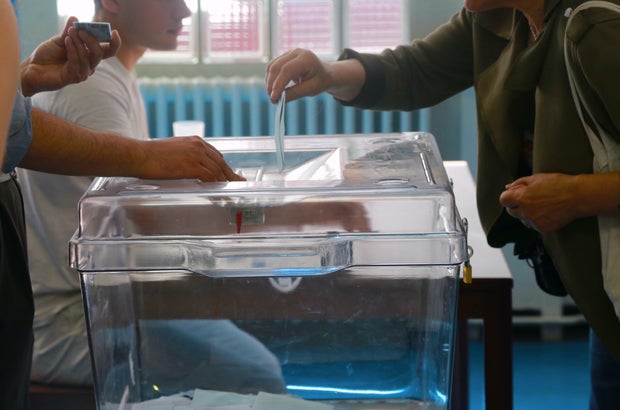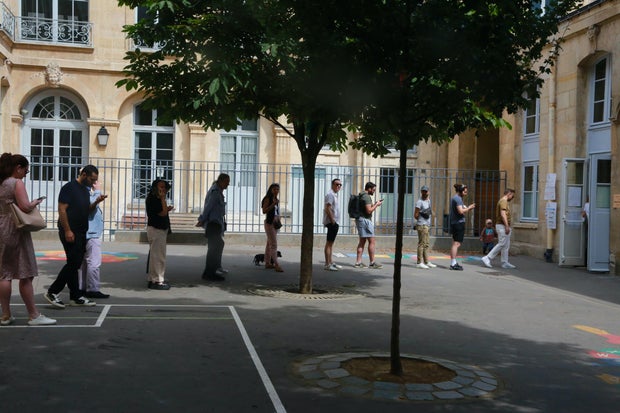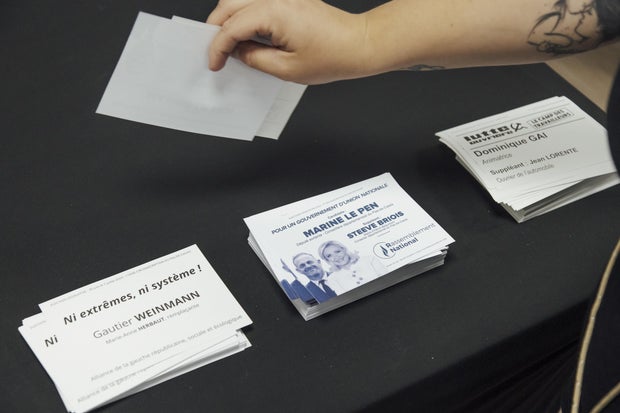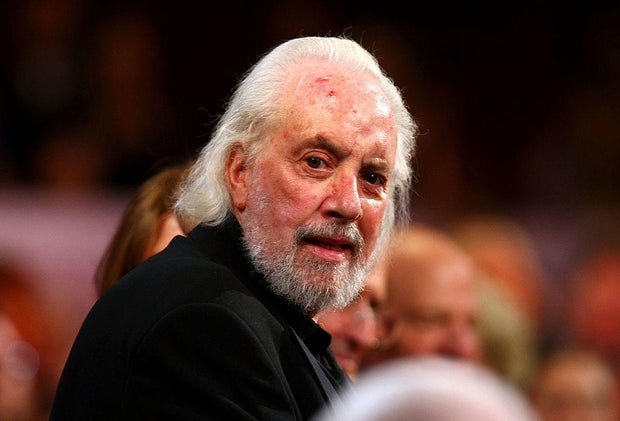CBS News
Strong turnout in France’s high-stakes elections as support for the far right grows

Voters across mainland France cast ballots Sunday in the first round of early parliamentary elections that could put the government in the hands of nationalist, far-right parties for the first time since the Nazi era.
The two-round elections that wrap up July 7 could impact European financial markets, Western support for Ukraine and the management of France’s nuclear arsenal and global military force.
Many French voters are frustrated about inflation and other economic concerns, as well as President Emmanuel Macron’s leadership, seen as arrogant and out-of-touch with their lives. Marine Le Pen’s anti-immigration National Rally party has tapped that discontent, notably via online platforms like TikTok, and led in pre-election opinion polls.
Owen Franken – Corbis/Getty Images
A new coalition on the left, the New Popular Front, also poses a challenge to the pro-business Macron and his centrist alliance Together for the Republic. It includes the French Socialists and Communists, the Greens, and the hard-left France Unbowed party and vows to reverse an unpopular pension reform law that raised the retirement age to 64, among other economic reforms.
There are 49.5 million registered voters who will choose the 577 members of the National Assembly, France’s influential lower house of parliament.
Turnout at midday Sunday stood at 25.9% according to interior ministry figures, higher than the 18.43% at midday during the 2022 legislative elections. The vote was taking place during the traditional first week of summer vacation in France, and absentee ballot requests were at least five times higher than in 2022.
The first polling projections were expected at 8 p.m. (1800 GMT), when final polling stations close. Early official results were expected later Sunday.
Macron voted in Le Touquet, a seaside resort in northern France. Le Pen also voted in the north, her party’s stronghold, but in the working-class town of Hennin-Beaumont.
Photo by Owen Franken – Corbis/Getty Images
Voters in Paris had issues from immigration to the rising cost of living on their minds as the country has grown more divided between the far right and far left blocs, with a deeply unpopular and weakened president in the political center. The campaign was marred by rising hate speech.
“People don’t like what has been happening,” said Cynthia Justine, 44. “People feel they’ve lost a lot in recent years. People are angry. I am angry.” She added that with “the rising hate speech,” it was necessary to express frustrations with those holding and seeking power.
She said it was important as a woman to vote since women haven’t always had that right. And “because I am a Black woman, it’s even more important. A lot is at stake on this day.”
Macron called the early elections after his party was trounced in the European Parliament election earlier in June by the National Rally, which has historic ties to racism and antisemitism and is hostile toward France’s Muslim community. It also has historical ties to Russia.
Macron’s call was an audacious gamble that French voters who were complacent about the European election would be jolted into turning out for moderate forces in national elections to keep the far right out of power.
Instead, preelection polls suggested that the National Rally is gaining support and has a chance at winning a parliamentary majority. In that scenario, Macron would be expected to name 28-year-old National Rally President Jordan Bardella as prime minister in an awkward power-sharing system known as “cohabitation.”
While Macron has said he won’t step down before his presidential term expires in 2027, cohabitation would weaken him at home and on the world stage.
A 64-year-old voter, Philippe Lempereur, expressed fatigue with politicians from the left, right and center and what he called their inability to work together on issues like ensuring people have shelter and enough to eat. “We vote by default, for the least worse option,” he said. “I prefer to vote than do nothing.”
The results of the first round will give a picture of voter sentiment, but not necessarily of the overall makeup of the next National Assembly. Predictions are difficult because of the complicated voting system, and because parties will work between the rounds to make alliances in some constituencies or pull out of others.
Cyril Marcilhacy/Bloomberg via Getty Images
In the past, such maneuvers helped keep far-right candidates from power. But support for Le Pen’s party has spread deep and wide.
Bardella, who has no governing experience, says he would use the powers of the prime minister to stop Macron from continuing to supply long-range weapons to Ukraine for the war with Russia.
The National Rally has also questioned the right to citizenship for people born in France and wants to curtail the rights of French citizens with dual nationality. Critics say this undermines human rights and is a threat to France’s democratic ideals.
Meanwhile, huge public spending promises by the National Rally and especially the left-wing coalition have shaken markets and ignited worries about France’s heavy debt, already criticized by EU watchdogs.
In the restive French Pacific territory of New Caledonia, polls closed earlier due to a curfew that authorities have extended until July 8. Violence there flared last month leaving nine people dead, due to attempts by Macron’s government to amend the French Constitution and change voting lists, which the Indigenous Kanaks feared would further marginalize them. They have long sought to break free from France.
Voters in France’s other overseas territories of Saint-Pierre-et-Miquelon, Saint-Barthélemy, Saint-Martin, Guadeloupe, Martinique, Guyana and French Polynesia and those voting in offices opened by embassies and consular posts across the Americas cast their ballots on Saturday.
CBS News
7/2: CBS Evening News – CBS News

Watch CBS News
Be the first to know
Get browser notifications for breaking news, live events, and exclusive reporting.
CBS News
Robert Towne, legendary Hollywood screenwriter of “Chinatown,” dies at 89

Robert Towne, the Oscar-winning screenplay writer of “Shampoo,” “The Last Detail” and other acclaimed films whose work on “Chinatown” became a model of the art form and helped define the jaded allure of his native Los Angeles, has died. He was 89.
Towne “passed away peacefully surrounded by his loving family” Monday at his home in Los Angeles, his publicist Carri McClure, told CBS News in a statement. She did not provide a cause of death.
In an industry which gave birth to rueful jokes about the writer’s status, Towne for a time held prestige comparable to the actors and directors he worked with. Through his friendships with two of the biggest stars of the 1960s and ’70s, Warren Beatty and Jack Nicholson, he wrote or co-wrote some of the signature films of an era when artists held an unusual level of creative control. The rare “auteur” among screen writers, Towne managed to bring a highly personal and influential vision of Los Angeles onto the screen.
Alberto E. Rodriguez/Getty Images for AFI
“It’s a city that’s so illusory,” Towne told The Associated Press in a 2006 interview. “It’s the westernmost west of America. It’s a sort of place of last resort. It’s a place where, in a word, people go to make their dreams come true. And they’re forever disappointed.”
Recognizable around Hollywood for his high forehead and full beard, Towne won an Academy Award for “Chinatown” and was nominated three other times, for “The Last Detail,” “Shampoo” and “Greystoke.” In 1997, he received a lifetime achievement award from the Writers Guild of America.
“His life, like the characters he created, was incisive, iconoclastic and entirely (original),” said “Shampoo” actor Lee Grant on X.
Towne was born Robert Bertram Schwartz in Los Angeles and moved to San Pedro after his father’s business, a dress shop, closed down because of the Great Depression. His father changed the family name to Towne.
Towne’s success came after a long stretch of working in television, including “The Man from U.N.C.L.E” and “The Lloyd Bridges Show,” and on low-budget movies for “B” producer Roger Corman. In a classic show business story, he owed his breakthrough in part to his psychiatrist, through whom he met Beatty, a fellow patient. As Beatty worked on “Bonnie and Clyde,” he brought in Towne for revisions of the Robert Benton-David Newman script and had him on the set while the movie was filmed in Texas.
Towne’s contributions were uncredited for “Bonnie and Clyde,” the landmark crime film released in 1967, and for years he was a favorite ghost writer. He helped out on “The Godfather,” “The Parallax View” and “Heaven Can Wait” among others and referred to himself as a “relief pitcher who could come in for an inning, not pitch the whole game.” But Towne was credited by name for Nicholson’s macho “The Last Detail” and Beatty’s sex comedy “Shampoo” and was immortalized by “Chinatown,” the 1974 thriller set during the Great Depression.
“Chinatown” was directed by Roman Polanski and starred Nicholson as J.J. “Jake” Gittes, a private detective asked to follow the husband of Evelyn Mulwray (played by Faye Dunaway). The husband is chief engineer of the Los Angeles Department of Water and Power and Gittes finds himself caught in a chaotic spiral of corruption and violence, embodied by Evelyn’s ruthless father, Noah Cross (John Huston).
Influenced by the fiction of Raymond Chandler, Towne resurrected the menace and mood of a classic Los Angeles film noir, but cast Gittes’ labyrinthine odyssey across a grander and more insidious portrait of Southern California. Clues accumulate into a timeless detective tale, and lead helplessly to tragedy, summed up by one of the most repeated lines in movie history, words of grim fatalism a devastated Gittes receives from his partner Lawrence Walsh (Joe Mantell): “Forget it, Jake, it’s Chinatown.”
The back story of “Chinatown” has itself become a kind of detective story, explored in producer Robert Evans’ memoir, “The Kid Stays in the Picture”; in Peter Biskind’s “East Riders, Raging Bulls,” a history of 1960s-1970s Hollywood, and in Sam Wasson’s “The Big Goodbye,” dedicated entirely to “Chinatown.” In “The Big Goodbye,” published in 2020, Wasson alleged that Towne was helped extensively by a ghost writer — former college roommate Edward Taylor. According to “The Big Goodbye,” for which Towne declined to be interviewed, Taylor did not ask for credit on the film because his “friendship with Robert” mattered more.
The studios assumed more power after the mid-1970s and Towne’s standing declined. His own efforts at directing, including “Personal Best” and “Tequila Sunrise,” had mixed results. “The Two Jakes,” the long-awaited sequel to “Chinatown,” was a commercial and critical disappointment when released in 1990 and led to a temporary estrangement between Towne and Nicholson.
Around the same time, he agreed to work on a movie far removed from the art-house aspirations of the ’70s, the Don Simpson-Jerry Bruckheimer production “Days of Thunder,” starring Tom Cruise as a race car driver and Robert Duvall as his crew chief. The 1990 movie was famously over budget and mostly panned, although its admirers include Quentin Tarantino and countless racing fans. And Towne’s script popularized an expression used by Duvall after Cruise complains another car slammed him: “He didn’t slam into you, he didn’t bump you, he didn’t nudge you. He rubbed you.
“And rubbin,′ son, is racin.'”
Towne later worked with Cruise on “The Firm” and the first two “Mission: Impossible” movies. His most recent film was “Ask the Dust,” a Los Angeles story he wrote and directed that came out in 2006. Towne was married twice, the second time to Luisa Gaule, and had two children. His brother, Roger Towne, also wrote screenplays, his credits include “The Natural.”
CBS News
Analyzing impact of Supreme Court’s Trump immunity decision

Watch CBS News
Be the first to know
Get browser notifications for breaking news, live events, and exclusive reporting.












